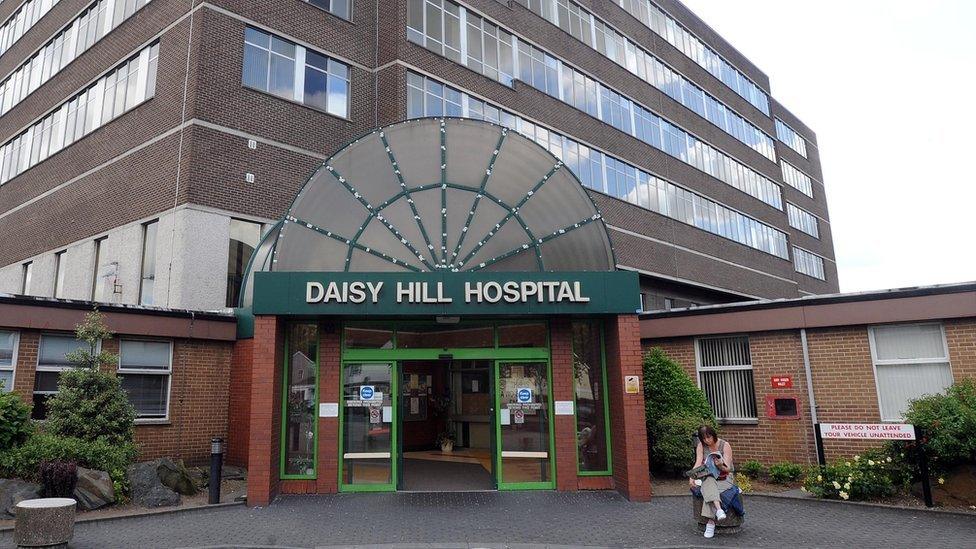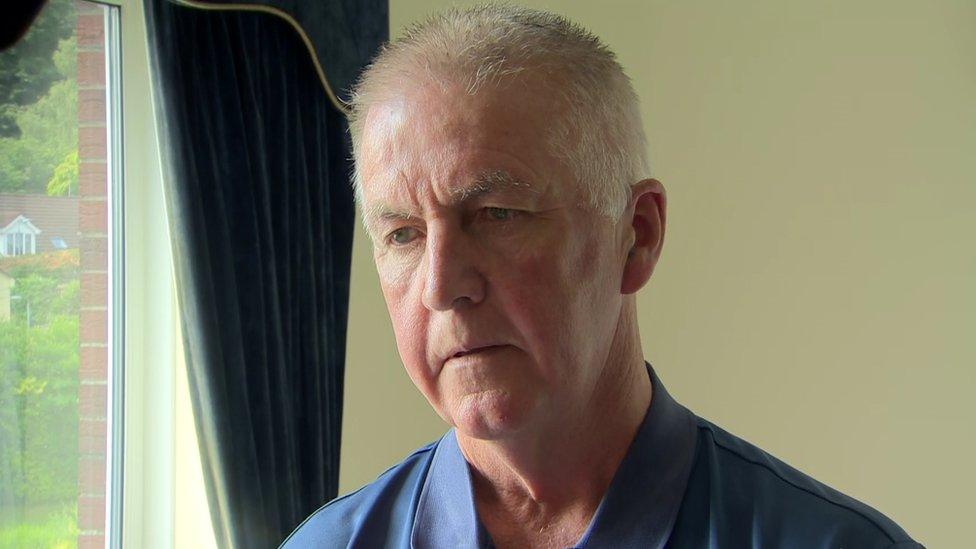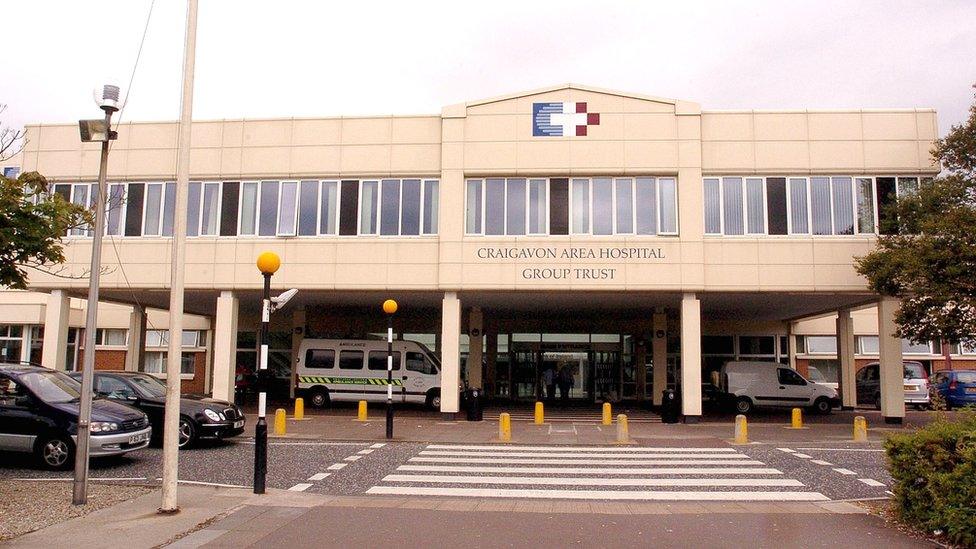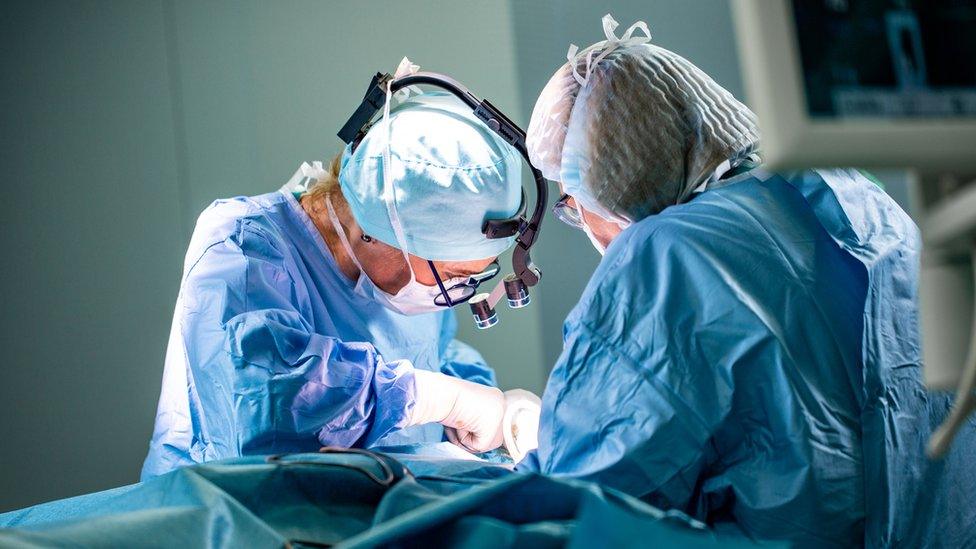Daisy Hill Hospital in Newry stabilised for summer, says trust
- Published

No jobs will be lost at Daisy Hill Hospital, say health officials
Inpatient services at Daisy Hill Hospital in Newry have been stabilised for the summer months, according to the Southern Health Trust.
The short-term plan includes support from three senior medical consultants from Craigavon Area Hospital.
The appointment of a chief operating officer for Daisy Hill and a temporary MRI scanner have also been secured.
The hospital will continue to run its emergency department on a 24/7 basis, said the trust.
Chief executive Dr Maria O'Kane told the Southern Health Trust's board meeting on Thursday that its aim was to find a "sustainable way forward for the hospital, its patients and staff".
She said it wanted to develop more "alternatives to inpatient medical admissions where appropriate" and "improve patient flow and discharge".
In a statement the trust said it would work with the Department of Health to "secure the longer-term sustainability of the hospital".
During the board meeting there were assurances that no jobs would be lost and that the emergency department was being enhanced, with some additional beds.
The hospital previously had capacity of 104 beds - it will now have about 83.
But that development led some attending the meeting to question how 83 beds would be sufficient, with 142 bed currently occupied at the hospital.
Eddie Curtis, from the campaign group SoS Daisy Hill, said the plan is not enough.
"The people of Newry have suffered for long enough - the people of south Down and south Armagh are the exact same," he said.

Campaigner Eddie Curtis said the plan is not enough
"We will not stop the campaign until we are satisfied that the label of 'Daisy Hill is closing' is taken away forever."
Earlier this month staff at Daisy Hill Hospital were notified of more proposed changes to services, including the creation of an emergency department short-stay unit.
The Southern Health Trust said the plans would ensure patient safety but the Daisy Hill Hospital Future Group, which is campaigning to keep hospital services, said unnecessary deaths would result from the decisions.
The announcement came after the hospital's stroke service was withdrawn on 31 May.
The trust said it would support staff's psychological safety, maintain a 24/7 emergency department and provide alternatives to hospital admission close to home for patients.
Previously in May it was reported that several medical staff had "ended their tenure" at Daisy Hill.

The short-term plan includes support from three consultants from Craigavon Area Hospital
A spokesperson for the trust said "recruiting and retaining enough medical staff has been a significant issue for the hospital".
'Rising demand for services'
After uncertainty about the future of the hospital's stroke service, the health trust provided an update on Thursday.
Its advice for patients with suspected stroke symptoms was to phone 999.
Due to a shortage of stroke consultants at Daisy Hill, suspected acute stroke patients being transferred to hospital by ambulance are being diverted to an alternative emergency department.
The trust said that 24/7 arrangements were in place for patients who attend Daisy Hill's emergency department and are assessed as having a stroke.
Where appropriate, they will receive appropriate treatment including thrombolysis - a clot-busting drug treatment - on site.
Patients will then be transferred to Craigavon Area Hospital or the Royal Victoria Hospital in Belfast for acute stroke care.
Those who require continued rehabilitation will return to Daisy Hill's stroke rehabilitation ward.
Dr O'Kane said that while the trust was now more "optimistic about stabilising services for the short term, rising demand for services, financial and workforce pressures and the need for modernisation, remain very real challenges across health and social care".
She said the trust and the board continued to work towards a "longer-term vision for the hospital" to ensure it remains an "essential part of the regional acute network".
Related topics
- Published2 June 2023

- Published15 May 2023

- Published27 January 2023
